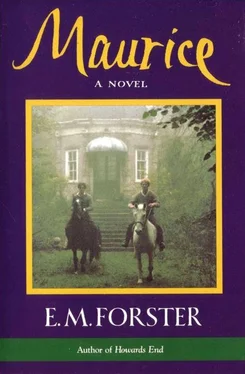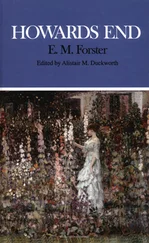11
After this crisis Maurice became a man. Hitherto — if human beings can be estimated — he had not been worth anyone's affection, but conventional, petty, treacherous to others, because to himself. Now he had the highest gift to offer. The idealism and the brutality that ran through boyhood had joined at last, and twined into love. No one might want such love, but he could not feel ashamed of it, because it was "he," neither body or soul, nor body and soul, but "he" working through both. He still suffered, yet a sense of triumph had come elsewhere. Pain had shown him a niche behind the world's judgements, whither he could withdraw.
There was still much to learn, and years passed before he explored certain abysses in his being — horrible enough they were. But he discovered the method and looked no more at scratches in the sand. He had awoken too late for happiness, but not for strength, and could feel an austere joy, as of a warrior who is homeless but stands fully armed.
As the term went on he decided to speak to Durham. He valued words highly, having so lately discovered them. Why should he suffer and cause his friend suffering, when words might put all right? He heard himself saying, "I really love you as you love me," and Durham replying, "Is that so? Then I forgive you," and to the ardour of youth such a conversation seemed possible, though somehow he did not conceive it as leading to joy. He made several attempts, but partly through his own shyness, partly through Durham's, they failed. If he went round, the door was sported, or else there were people inside; should he enter, Durham left when the other guests did. He invited him to meals — he could never come; he offered to lift him again for tennis, but an excuse was made. Even if they met in the court, Durham would affect to have forgotten something and run past him or away. He was surprised their friends did not notice the change, but few undergraduates are observant — they have too much to discover within themselves and it was a don who remarked that Durham had stopped honeymooning with that Hall person.
He found his opportunity after a debating society to which both belonged. Durham — pleading his Tripos — had sent in his resignation, but had begged that the society might meet in his rooms first, as he wished to take his share of hospitality. This was like him; he hated to be under an obligation to anyone. Maurice went and sat through a tedious evening. When everyone, including the host, surged out into the fresh air, he remained, thinking of the first night he had visited that room, and wondering whether the past cannot return.
Durham entered, and did not at once see who it was. Ignoring him utterly, he proceeded to tidy up for the night.
"You're beastly hard," blurted Maurice, "you don't know what it is to have a mind in a mess, and it makes you very hard."
Durham shook his head as one who refuses to listen. He looked so ill that Maurice had a wild desire to catch hold of him.
"You might give me a chance instead of avoiding me — I only want to discuss."
"We've discussed the whole evening."
"I mean the Symposium, like the ancient Greeks."
"Oh Hall, don't be so stupid — you ought to know that to be alone with you hurts me. No, please don't reopen. It's over. It's over." He went into the other room and began to undress. "Forgive this discourtesy, but I simply can't — my nerves are all nohow after three weeks of this."
"So are mine," cried Maurice.
"Poor, poor chap!"
"Durham, I'm in Hell."
"Oh, you'll get out. It's only the Hell of disgust. You've never done anything to be ashamed of, so you don't know what's really Hell."
Maurice gave a cry of pain. It was so unmistakable that Durham, who was about to close the door between them, said, "Very well, 111 discuss if you like. What's the matter? You appear to want to apologize about something. Why? You behave as if I'm annoyed with you. What have you done wrong? You've been thoroughly decent from first to last."
In vain he protested.
"So decent that I mistook your ordinary friendliness. When you were so good to me, above all the afternoon I came up — I thought it was something else. I am more sorry than I can ever say. I had no right to move out of my books and music, which was what I did when I met you. You won't want my apology any more than anything else I could give, but, Hall, I do make it most sincerely. It is a lasting grief to have insulted you."
His voice was feeble but clear, and his face like a sword. Maurice flung useless words about love.
"That's all, I think. Get married quickly and forget."
"Durham, I love you."
He laughed bitterly.
"I do — I have always —"
"Good night, good night."
"I tell you, I do — I came to say it — in your very own way — I have always been like the Greeks and didn't know."
"Expand the statement."
Words deserted him immediately. He could only speak when he was not asked to.
"Hall, don't be grotesque." He raised his hand, for Maurice had exclaimed. "It's like the very decent fellow you are to comfort me, but there are limits; one or two things I can't swallow."
"I'm not grotesque —"
"I shouldn't have said that. So do leave me. I'm thankful it's into your hands I fell. Most men would have reported me to the Dean or the Police."
"Oh, go to Hell, it's all you're fit for," cried Maurice, rushed into the court and heard once more the bang of the outer door. Furious he stood on the bridge in a night that resembled the first — drizzly with faint stars. He made no allowance for three weeks of torture unlike his own or for the poison which, secreted by one man, acts differently on another. He was enraged not to find his friend as he had left him. Twelve o'clock struck, one, two, and he was still planning what to say when there is nothing to say and the resources of speech are ended.
Then savage, reckless, drenched with the rain, he saw in the first glimmer of dawn the window of Durham's room, and his heart leapt alive and shook him to pieces. It cried "You love and are loved." He looked round the court. It cried "You are strong, he weak and alone," won over his will. Terrified at what he must do, he caught hold of the mullion and sprang.
"Maurice —"
As he alighted his name had been called out of dreams. The violence went out of his heart, and a purity that he had never imagined dwelt there instead. His friend had called him. He stood for a moment entranced, then the new emotion found him words, and laying his hand very gently upon the pillows he answered, "Give!"
12
Clive had suffered little from bewilderment as a boy. His sincere mind, with its keen sense of right and wrong, had brought him the belief that he was damned instead. Deeply religious, with a living desire to reach God and to please Him, he found himself crossed at an early age by this other desire, obviously from Sodom. He had no doubt as to what it was: his emotion, more compact than Maurice's, was not split into the brutal and the ideal, nor did he waste years in bridging the gulf. He had in him the impulse that destroyed the City of the Plain. It should not ever become carnal, but why had he out of all Christians been punished with it?
At first he thought God must be trying him, and if he did not blaspheme would recompense him like Job. He therefore bowed his head, fasted, and kept away from anyone whom he found himself inclined to like. His sixteenth year was ceaseless torture. He told no one, and finally broke down and had to be removed from school. During the convalescence he found himself falling in love with a cousin who walked by his bath chair, a young married man. It was hopeless, he was damned.
These terrors had visited Maurice, but dimly: to Clive they were definite, continuous, and not more insistent at the Eucharist than elsewhere. He never mistook them, in spite of the rein he kept on grossness. He could control the body; it was the tainted soul that mocked his prayers.
Читать дальше












